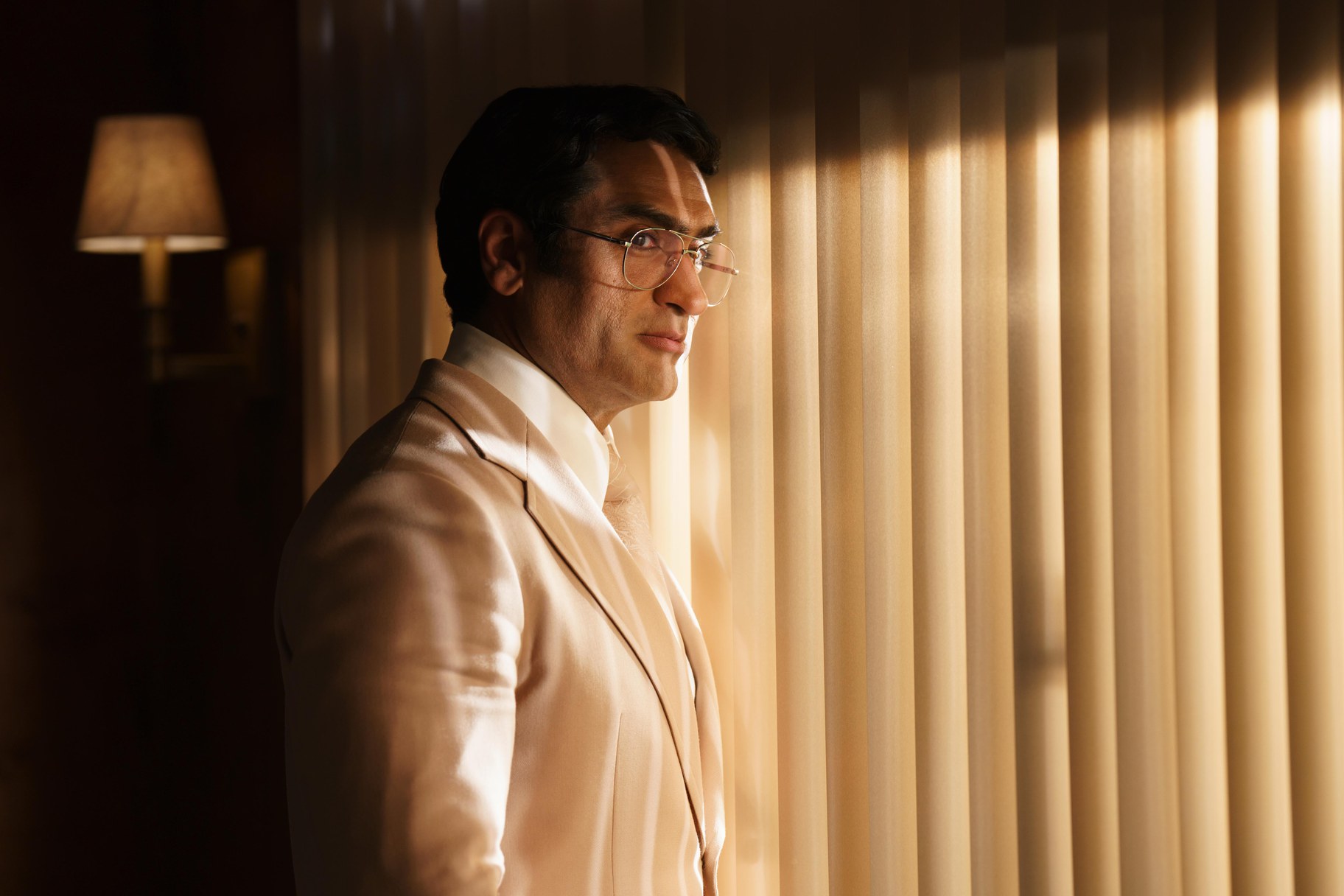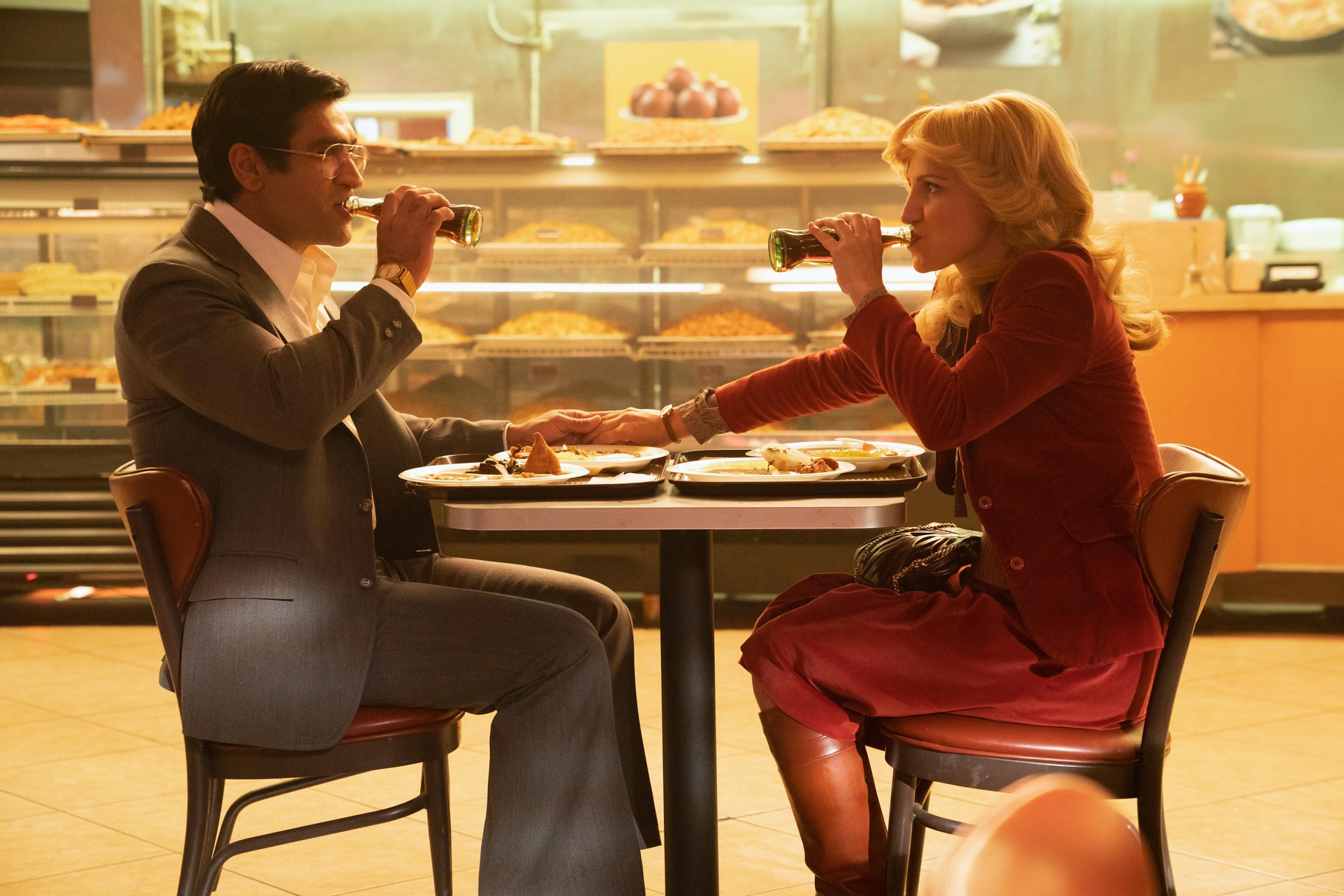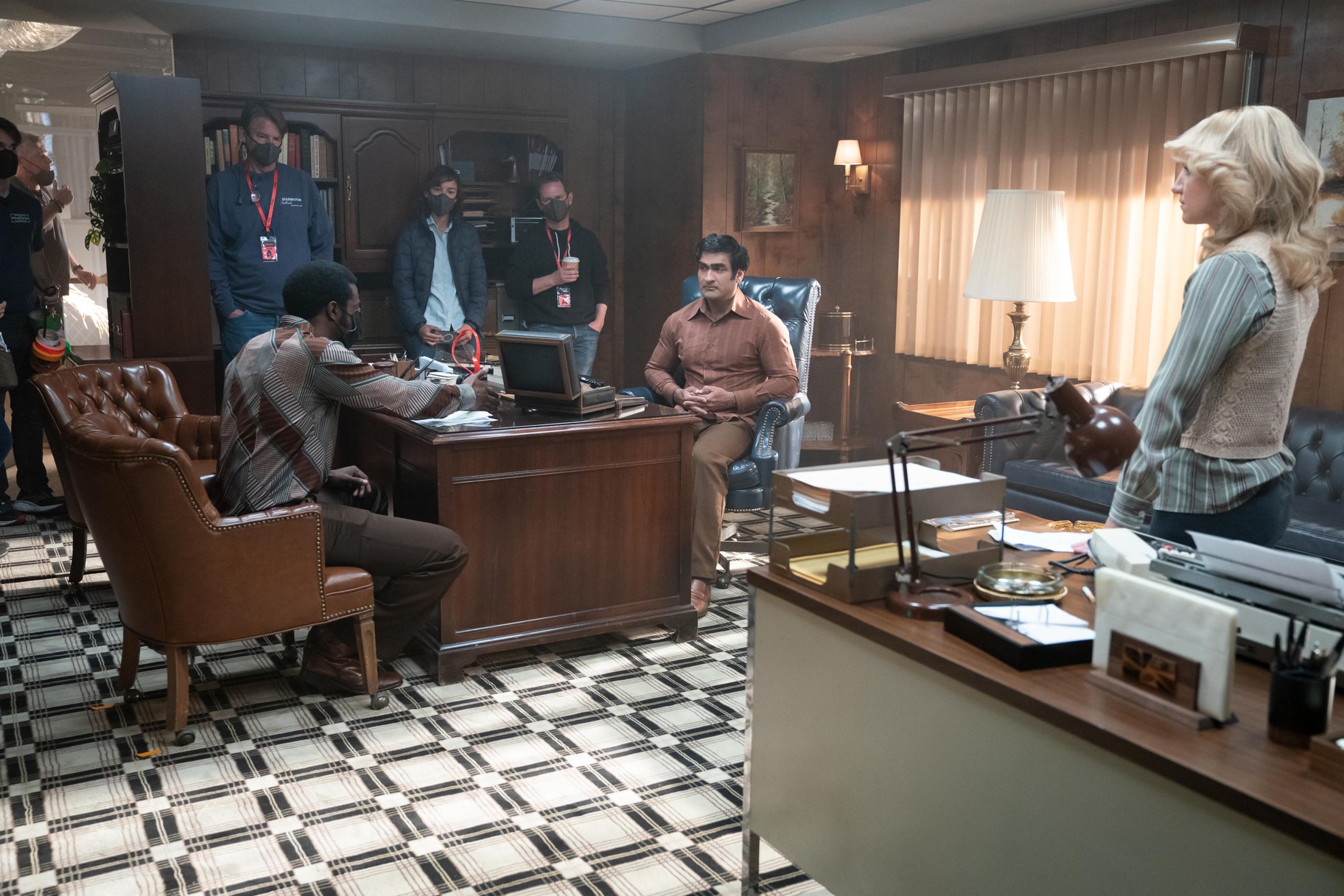Kumail Nanjiani spent years doing stand-up and acting in comedic roles before tackling Hulu’s new dark drama series “Welcome to Chippendales.” While he says he was the first person to join the show, after creator Robert Siegel’s invitation in 2021, it took him years to say yes to the project because he was intimidated by it.
“After many, many conversations, I said, ‘I think [my wife Emily V. Gordon] and I should produce this together because [she is] so smart, and so good with scripts and all this stuff.”
And as soon as they joined, Hulu called saying the show was greenlit and a writers room was being put together. “It happened really, really fast,” he says. “Casting started up a couple months later.”
Siegel’s “Welcome to Chippendales” chronicles the real-life of Somen “Steve” Banerjee, played by Nanjiani. Banerjee founded the famously cuffed and collared male dance troupe “Chippendales,” which became a phenomenon in the United States in the mid-70s. The Indian immigrant and entrepreneur rose from gas station employee, to owner of the first nightclub to spotlight male strippers targeting a female audience. The series also features Murray Bartlett, Annaleigh Ashford, Dan Stevens, and Juliette Lewis.
In this first of a two-part conversation, Nanjiani discusses playing a dramatic role in a series, co-producing it, figuring out how to play this real-life character, and working in a collaborative environment.
Joining a limited series, not a film
When Siegel first thought of “Welcome to Chippendales,” he conceived it as a film. But in 2021, Siegel approached Nanjiani again with a limited-series concept proposal.
This time, the comedian said he reached out to his friend British-Pakistani actor, producer, writer Riz Ahmed, who had done the drama series “The Night Of.” Nanjiani thought Ahmed’s performance was similar to the role he would play in Chippendales, in which both characters transform over the course of the series.
“I really talked to him a bunch about it, and [Ahmed] said, ‘The really good thing with limited series is that you can really trust the scene…because the writing is just going to carry you through,’” Nanjiani remarks. That is not possible in a two-hour film because the actor has to fill the performance gaps, according to Ahmed.
That conversation was helpful to Nanjiani because it took a lot of pressure off, allowing him to “isolate the little moments where there’s shifts in his character.”
Co-producing the series
Not only does Nanjiani star in the dark dramatic series, he and his wife co-produced it, by giving notes on the scripts, casting and editing. “We were involved with all of it,” he says, while Siegel and producer Jenni Konner ran the writers room.
“I had to just sort of approach it from my character's perspective and say, ‘This scene, can we adjust this,” he recalls. “[It] was very collaborative, so it was a great experience.”
However, Nanjiani says it was also very scary because once they started shooting, they only had four scripts.
“So you had to prep episodes five and six while you're shooting episodes three and four, and then prep seven and eight, while you're shooting episodes five and six,” he explains.
At one point, he asked the producers to give him a couple of days to go over the material because it was so heavy. “I'm pretty slow with this stuff,” he remarks.

Kumail Nanjiani plays Somen “Steve” Banerjee, an Indian immigrant who became the unlikely founder of the world’s greatest male-stripping empire in “Welcome to Chippendales.” Photo by Erin Simkin/Hulu.
A major physical transformation
To play Banerjee, Nanjiani went through a major physical transformation. Following a fit shape playing Kingo on Marvel’s “Eternals,” for the Chippendales’ series he took the opposite direction. “There is no padding anywhere, no prosthetic. That's me,” he quips.
Once Nanjiani saw a picture of the ambitious Indian-American entrepreneur, it stuck with him, and it was the key to figuring out his character.
“He's sort of this fat, brown, nerdy guy in a suit, surrounded by these white Adonises, and he looked like he was the king of a world that he did not belong in,” Nanjiani observes. “So I knew I had to change how I looked because I think the part really demanded it. I had to make sure I couldn't look like someone who could jump on stage with these guys.”
Getting into character
When Nanjiani signed up for the dark dramatic role, he thought through how he would embody Banerjee.
“I studied the character as written more than I studied the real life of the guy because I was like, ‘I'm not playing Elvis, I have to play this character the way he's written in the scripts,’” he says.
And to make Nanjiani’s character more compelling, he starts off as innocent, but after making one poor choice after another, Banerjee eventually gets in a great deal of trouble.
“In some ways, [he’s] a tragic figure. In the beginning, he's childish, and I think that sort of innocence or childishness in a grown up with power can be very dangerous,” Nanjiani notes. “You can truly end up doing evil if you have a child's sense of emotionality and morality, and the resources of an adult.”

Steve (Kumail Nanjiani) drinks with accountant Irene (Annaleigh Ashford) in “Welcome to Chippendales.” Photo by Erin Simkin/Hulu.
“It's like severance. We have to cut ourselves off.”
While Nanjiani enjoyed playing the dramatic role for five months, he felt it was a long time to live inside someone else’s skin. “I wanted to be a good husband, I wanted to be a good friend [to] my friends, I wanted to be myself,” he says. “I have no interest in living as a character for months at a time because I really like my life.”
In order to go back to his real life, he and his co-star Ashford came up with a metaphor at the end of filming: “It's like severance,” he explains, “We have to cut ourselves off.”
Being cast in a dramatic role
With a full comedic acting resume, it may not seem like a logical career move for Nanjiani to join a drama series. Siegel had done it in 2009 by casting stand-up comic and actor Patton Oswalt on his directorial debut drama film “Big Fan.”
For Siegel, selecting a comedian for a dramatic role made sense because “comedians in general have a dark side, so crossing over from comedy to drama is not that much of a stretch,” the writer-director said in an interview in 2009.
“I think it's true for a lot of people. I certainly don't feel that way. I don't see myself as a fundamentally dark person,” Nanjiani observes.
He adds that he “just wanted to be funny,” but the only way to get his comedy out was by being on stage. “I think a lot of people have a desire to be in the spotlight, and I had the opposite of that. For me, doing stand-up was really hard specifically because I didn't want any attention.”
Working collaboratively
When doing stand-up, Nanjiani says he was constantly thinking about defending himself, or thinking of being in the offense because it’s so competitive.
“With stand-up, it is a lot of making fun of each other. That's how you show love and affection, is by attacking each other,” he explains. “I could not imagine asking for help [from] my comedian friends, being vulnerable in that way, because then they sense weakness.”
But working with a dynamic cast of theater actors in the series, he says it was a breath of fresh air.
“In doing the show, it just felt so collaborative, and completely uncompetitive. I really felt like all these actors were there to make each other better.”
For the first time in his career, if he had trouble with a scene he could ask his fellow actors for help. “They would sit on the floor and work through the scene with me, and it was really beautiful,” he observes. “I really got to learn from these people who [are] also all coming from a different world. I get emotional talking about [them], because they really, really carried me through this.”

Director Matt Shakman goes over a scene with actors Quentin Plair, Kumail Nanjiani and Annaleigh Ashford, while other “Welcome to Chippendales” crew observe. Photo by Erin Simkin/Hulu.
What’s next?
After co-writing 2017’s “The Big Sick,” and now, being involved from beginning to end with “Welcome to Chippendales, Nanjiani and his wife want to continue to be active in the producing space.
“Ideally, I want to do all [the] pieces of all the things,” he says. “We want to be able to produce and just make the kinds of stuff that we would enjoy watching and stuff that we could add value to.”
“Welcome to Chippendales” limited series premiered on November 22 and
is now streaming on Hulu.
